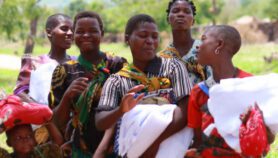Send to a friend
The details you provide on this page will not be used to send unsolicited email, and will not be sold to a 3rd party. See privacy policy.
Below is a round up of news from or about Sub-Saharan Africa for the period 28 August–10 September 2008.
West African hydrogen lab dumped in Nigeria
Inuwa Funtua of Nigeria’s National Centre for Energy Research and Training has confirmed reports that a national hydrogen laboratory project, funded by the International Atomic Energy Agency, has been abandoned for four years in Zaria. Only two such labs exist on the continent, in Egypt and South Africa. More>>
African nations sign up for new meningitis vaccine
Burkina Faso will be the first of 25 countries in Africa’s meningitis belt — from Ethiopia to Senegal — to try a highly promising, inexpensive meningitis vaccine next year. Paediatric vaccine trials and follow-ups are underway in Ghana and Mali. More>>
One billion Euros to electrify Africa
African countries have agreed a 24-month partnership with the European Union to generate more electricity for the continent. Ethiopia, Kenya, Namibia and Senegal are amongst those who will benefit from the Electricity Master Plan for Africa, which will provide support for the Africa power pools and the African Forum for Utility Regulators. More>>
Free mosquito bednets misused for fishing in Lake Victoria
Long-lasting insecticide treated nets meant to protect Kenyan children from malaria-bearing mosquitoes are being used by residents around Lake Victoria for fishing and drying fish. Many villagers are not convinced that the nets prevent malaria, according to Gabriel Dida of Maseno University’s School of Public Health. More>> ![]() [603kB]
[603kB]
Citizen carbon trading ‘would generate income for poor South Africans’
A carbon trading report on South Africa predicts that the poorest 70 per cent of the population could raise their incomes significantly if they were empowered to sell their own shares of carbon dioxide gas emissions every year. But the report, from Ireland’s Foundation for the Economics of Sustainability, says the region’s coal dependent economy would suffer. More>>
Africa boosts carbon offset and clean energy efforts
Over 600 people attended the first all-Africa Carbon Forum ![]()
![]()
![]()
![]()
![]()
![]()
![]()
![]()
![]()
![]()
![]()
![]()
![]()
![]()
![]()
![]()
![]()
![]()
South Africa’s expanding satellite business
Bart Cilliers of SunSpace, a University of Stellenbosch spin-off company, says South Africa is exporting satellites and satellite components to four continents. "Space stimulates the interest of young people. Having a national ability to design and build satellites, and having a national satellite in space, are a great motivator to study science," said Cilliers. More>>
Tanzania: Shortage of engineers bites
Tanzania only produces 500 engineers a year, says Ninatubu Lema, chairperson of the Engineers Registration Board and deputy principal of the College of Engineering and Technologyat the University of Dar es Salaam. Lema says the nation needs to train over 20,000 engineers annually to catch up with other nations. More>>
‘Preventable’ kidney disease deaths challenging South Africa
Thousands of South Africans with kidney disease die each year due to the shortage of facilities. Renal failure is on the increase due to untreated hypertension, diabetes and obesity, as well as HIV and abuse of the drug tik (methamphetamine). More>>
Sawdust waste powers mill in rural South Africa
A South African gasification project has successfully powered a rural sawmill using 150 kilograms an hour of sawdust, or other wood biomass. Ntshengedzeni Mamphweli and Edson Meyer of Fort Hare Institute of Technology say villagers’ health has improved now that the waste is no longer burnt. They plan to extend the system to power a bakery and grain mill. More>> ![]()
![]()
![]()
![]()
![]()
![]()
![]()
![]()
![]()
Compiled by Christina Scott.
If you would like to suggest a story for this news in brief, please contact the Africa News Editor Christina Scott ([email protected]).













